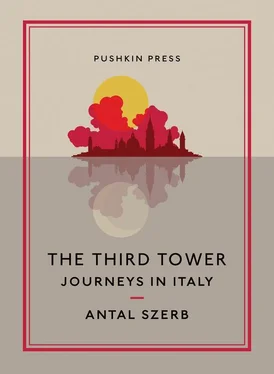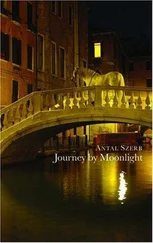As I stood there myself, gazing at the harmonious lines of a Palladian villa, I could see only what was Goethe-like, what spoke of his Iphigenia . Some miraculous preexisting harmony seems to operate in the human soul: an architect is born in Italy and creates certain works so that two hundred years later a poet can arrive from Germany and, through those works, come to understand himself and his destiny. Meanwhile, in all that time, how many nations, and how many generations, have annihilated one another! Mihály Babits is right when he tells us: “Great minds call to one other across time and space.”
A GRIMLY HANDSOME CITY. It was through its southern portal that the Northern invaders burst into Italy. Theodoric the Great gave it its name by associating it with Dietrich von Bern, the most potent figure in the ancient myths of the conquering Northerners, the wild hunter who charges headlong in all his Goth (and Gothic) restlessness across the bronze gates of the Cathedral of St Zeno.
It was ruled by that most virile of city dynasties, the Scaligers. Their name is preserved in the city emblem of the ladder and in two splendid tombs, the Can Grande (the Great Dog) and the Can Signorino (the Princely Dog). What expressive, and what Red Indian sounding epithets! In the court of Cangrande himself Florence’s most famous exile lived and pined away to his death, after years of climbing the steps to other men’s houses and eating alien bread.
I arrived at a bad moment. It was Ferragosto, the 15th of August, and to cap it all there were outdoor games in the Arena for which the whole of Italy had turned up, travelling on spectacularly discounted tickets. In the city you no sooner worked your way past one Italian tourist than you bumped into another. It was like being in Salzburg — a cut-price, petty-bourgeois, Fascist Salzburg.
I panicked and took refuge in the Cathedral. There, as if it were the most natural thing in the world, some tiny children were finishing their devotions beneath Titian’s Annunciation. Who knows what mischief they might have got into had it not been under his eye that they said their Hail Marys? I stepped outside, into the nearby Church of St Zeno, with its quite astonishing air of solitary grandeur, then made my way back to the Castelvecchio, the old fortress of the Scaligers, from which they controlled the city and surrounding countryside.
A bridge, built in the same style as the fortress, extends the city beyond the rushing waters of the Adige. By the “same style” I mean of course the familiar red brickwork and battlements in MMMMM formation that line the tops of walls and houses and represent the Italian Gothic. They are at once formidable, like the feathered headdress of a Red Indian chieftain, and a childish masquerade. You really have to see these battlements (they adorn city halls everywhere) to understand the significance of these local dynasties. All of them — here the Scaligers, in Bologna the Bentivoglios, in Ravenna the Polentas, and in Rimini the appalling Malatestas, all so supremely unforgettable that they haunt every step of my present travels — were really just city mayors fitted out with Indian headdresses. Their protégés were regarded less as town councillors than as a praetorian guard, and they overcame their opponents not with stonemasonry saws but with daggers.
It was now evening, and I was tired. I made my way back to the Piazza Bra and seated myself on the terrazzo of a coffee house. I wanted to watch the crowd strolling around the square before going on to the performance in the Arena. “Wonderful,” I said to myself. “This is exactly what they were doing in Goethe’s day, and even before that — everyone so friendly, the men looking so intelligent and wise… and while Italian women are not exactly beautiful, at this time of day they seem as mysterious as objects. But so many people! So many, many people.”
I found I couldn’t take any more, and set off in search of dinner.
THE CONFESSION OF A BOURGEOIS
AND THEN IT BEGAN. In fact it had already started, on that crowded train. But it was only now that I became aware of it.
The larger restaurants were crammed to bursting with the festive hordes, so I wandered about until I found a splendidly ancient cul-de-sac, or rather courtyard, leading off a wonderfully historic street, with tables laid out for dinner. A trattoria . I sat down beside an ancient wall, removed my coat like everyone else, and the pretty waitress brought me an excellent pasta asciutta and other local dishes.
And yet I didn’t feel at all comfortable. A painful childhood memory had suddenly assailed me. The feelings children have about incidents in family life are much more strongly developed (at least in my own experience) than adults generally realize. And they are perhaps even more intense than those of adults, because instinctive and without boundaries. We all know that the first question the little dears ask in the playground is, “What does your father do?” and only if they get the correct answer will they start to make friends. Children are incapable of making allowances for differences of social class. (Most dogs are the same.)
And it now came back to me that when I was a child and we used to travel abroad there would be times when my father, in an uncharacteristic fit of penny-pinching, and knowing that none of his acquaintance would be likely to see him, would take us to the sort of lower-class restaurant, like the one I was sitting in now, that he would normally never set foot in. Even then, as a child, I was filled with shame. I felt both humiliated and crushed, and I deeply pitied my parents because I imagined they must be suffering even more than I was.
And now in Verona, after I had looked around the little historic courtyard and decided that my fellow diners must all be the janitors of large tenement blocks, and it had transpired, after a few brief words with the man sharing the table with me, that he was a chauffeur, I was seized by that same childhood feeling. But I am no longer a child: I am no longer free to submit to such things. In my chequered youth I had eaten with even poorer people, not out of choice but financial constraint, and certainly not in such a historic courtyard or with such good fare. But it was no use. I didn’t feel at all comfortable. I paid my bill and went to the hotel.
There, things simply got worse. It was quite a good hotel, right on the Piazza Erbe, which, according to Baedeker (and he should know), is the most picturesque town square in all Italy. I took in little of this picturesque quality, for reasons that will immediately become apparent. I had not been able to find a room in all Verona: this was the only place to offer me one — adding, “You must take it as you find it.”
What I found was a positively microscopic attic room, and what was especially worrying was that the door didn’t sit in the frame as it should have, nor did it close properly. Furthermore, the window was nowhere near the top of the wall, but at the bottom, in the true historic manner. Had I lain on my stomach I could have looked straight down onto the picturesque Piazza Erbe. None of this had really bothered me at midday when I took the room. I told myself it would do for one night, and that in my chequered youth I had slept in far worse, and plenty of those too. But when I came back to it at night, with my middle-class sensibilities in turmoil, that room became a torture chamber.

It was appallingly hot. The authentic floor-level window let in very little air but a great many mosquitoes. Moreover, the room, by means of the door that wouldn’t close, adjoined another, one of those long corridor-like rooms you often find in Italian hotels in which they store linen and household implements and carry out ironing and other such chores. But now, in view of the flood of visitors, even that had been made available — to an elderly and completely insane Italian. Twice in the course of the night, each time just as I was drifting off to sleep, he barged into my room and, when I shouted at him, withdrew, uttering incomprehensible noises. True, I had my revenge. As soon as I reckoned he would be, as I had been, on the point of sleep, I opened my door softly, like a ghost, and then shut it again in the same soft and ghostly manner, and made eerie wailing noises.
Читать дальше













